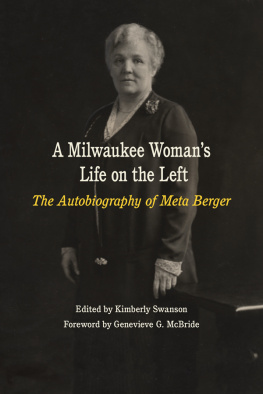Introduction
Congressman, newspaper editor, and co-founder of the Socialist Party of America, Victor Luitpold Berger was the most successful politician in his partys history.
Berger preached the gospel of social democracy, and although he envisaged the eventual arrival of the cooperative commonwealth, he worked for a set of immediate demands that would ameliorate the conditions of the working class. Ironically, his persecution by the federal government for his opposition to American involvement in World War I aided his political career and made him a symbol for civil libertarians during the 1920s. Tagged a radical early in his career, by the time Berger left the U.S. House of Representatives in 1929, Congressman Fiorello La Guardia (R-N.Y.) called him a pioneer, popularizing ideas of political and social reform long before they are accepted by the many.

Born to Ignatz and Julia Berger on February 28, 1860, in Nieder-Rehbach in Austria-Hungary, Victor was the eldest of seven children (two boys and five girls) in a comfortable Jewish family that prized education. Victors parents sent him to a local Lutheran minister for tutoring and later to schools in Budapest and Vienna, although he never completed his studies or received a college degree. Throughout his life he remained an avid reader, and he eventually accumulated one of the largest private libraries in Milwaukee. The threat of conscription into the Austro-Hungarian army led to Victors emigration to America in 1878; his family followed shortly thereafter. After living briefly in New York City, his parents and siblings settled in Bridgeport, Connecticut, where they earned a good living by retailing shoes and leather goods and later by investing in real estate.
After his arrival in the United States, Victor traveled around the country, holding odd jobs ranging from repairing wash boilers to punching cattle. He eventually learned the trade of metal polishing before moving to Milwaukee in 1881. He became a naturalized citizen five years later. The large German-speaking community in Milwaukee provided ample opportunities for his talents, and he soon became active in German-American organizations and wrote for the German-language press as a drama critic. For nearly ten years beginning in the fall, 1883, he taught German and other subjects in the citys public schools.
Although an adequate teacher, Berger preferred life in the public arena, where he could indulge his passion for politics. Throughout the 1880s, he became increasingly engaged with the great social issues of his timequestions of the role of capital, the organization of labor, and the ways in which a humane society could be constructed in the new industrial era. With its active Turnverein (social and athletic clubs that promoted free thinking), Milwaukee provided Berger with an intellectual atmosphere in which he could imbibe the latest socialist thought imported from Germany. His service as secretary and president of Milwaukees South Side Turn Society helped him develop his organizational and political skills. Embracing socialism, Berger became active in local labor politics, joined the Knights of Labor, and briefly belonged to the Socialist Labor Party.
In December, 1892, Berger left the school system and purchased a German-language labor newspaper, the Milwaukeer Volkszeitung, renaming it the Wisconsin Vorwrts (Forward). He ran the paper as a daily from January, 1893, until August, 1898, when financial setbacks forced him to scale it back to a weekly, called simply the Vorwrts. From the beginning, Berger sought to tie his publishing efforts to the labor movement. The Wisconsin Vorwrts served as the official newspaper of the Wisconsin State Federation of Labor and of the Milwaukee Federated Trades Council, thus forging the links between organized labor and Bergers political machine that later served his cause so well. Berger moved quickly from state labor politics to the national arena. Starting in 1898, he attended the annual conventions of the American Federation of Labor (AFL), where he regularly locked horns with Samuel Gompers, who opposed Bergers efforts to tie the labor movement to the socialist cause.
Bergers involvement with labor politics was inextricably linked to his desire to form a political party that would serve the cause of social democracy and in which he would play a major part. During the 1890s, Berger dabbled with Populism, serving as a delegate to the Peoples Partys 1894 Wisconsin convention and to the partys 1896 national convention, where he attempted to secure the presidential nomination for Eugene V. Debs, leader of the American Railway Union. The partys endorsement of William Jennings Bryan ended Bergers interest in the Populists, and he staked his future on Debss ability to generate a new political movement.
Berger first met Debs in 1895, while the latter was in jail in Woodstock, Illinois, for his role in the Pullman strike the previous year. Debs later recalled how Berger had given him an inscribed copy of Karl Marxs Das Kapital and delivered the first impassioned message of socialism I had ever heardthe very first to set the wires humming in my system.
Although Debs refused to follow Bergers urging and run for president in 1896, the two men worked together a year later to convert the remnants of the American Railway Union into the Social Democracy of America. In 1898 Berger convinced Debs to bolt from his own organization and form the Social Democratic Party, a move that led in 1900 to the first of Debss five runs for the presidency. The Social Democrats merged with Morris Hillquits dissenting faction of the Socialist Labor Party, and in 1901 the two groups created the Socialist Party of America. Berger remained a leader of that organization for the remainder of his life.
While Berger was attempting to create a new political party, he married Meta Schlichting, who would become his political confidante and adviser, and began a family. Born in Milwaukee to Bernhard and Mathilde Schlichting on February 23, 1873, Meta was the second of five children. Her parents were natives of Germany; Bernhard came to Wisconsin in 1847 at age nine, and Mathilde immigrated in 1852, when she was five. The Schlichtings took an interest in politics in their adopted country, and both Metas father and his brother served in the Wisconsin legislature as Republicans. Thirteen years younger than Victor, Meta recalled seeing him nervously coming to a job interview with her father, who was then serving on the Milwaukee school board, and she later studied German under her future husband. Following Bernhards death in 1883, Victor frequently dined at the Schlichting house, as Metas mother tried to raise money by providing meals for teachers. Although the family had lost its principal wage earner, Meta insisted on getting an education and earned a teaching degree from the Milwaukee State Normal School in 1894. Following graduation, she taught in the Milwaukee public schools, yielding her position when she married Victor on December 4, 1897.











